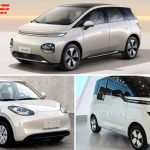The global electric vehicle (EV) market is rapidly expanding, and a significant contributor to this growth is the rise of the Chinese electric car. Known for their affordability and innovative features, these vehicles are increasingly appealing to consumers worldwide. As China continues to establish itself as a dominant force in the automotive industry, the Chinese electric car is becoming a symbol of the future of transportation, offering a blend of cost-effectiveness, advanced technology, and environmental sustainability.
The Growth of the Chinese Electric Car Market
Rapid Expansion and Government Support
The Chinese electric car market has seen explosive growth over the past decade, largely driven by strong government support. The Chinese government has implemented a range of policies aimed at promoting electric vehicles, including subsidies for manufacturers, tax incentives for buyers, and investment in charging infrastructure. These initiatives have helped to create a favorable environment for the development and adoption of electric vehicles in China.
In addition to government support, the Chinese electric car market has benefited from the country’s focus on reducing air pollution and carbon emissions. As the world’s largest emitter of greenhouse gases, China has made a significant commitment to transitioning to clean energy, with electric vehicles playing a central role in this effort. This focus on sustainability has further fueled the growth of the electric car market, making China the largest producer and consumer of electric vehicles globally.
Leading Manufacturers and Innovation
China is home to several leading electric vehicle manufacturers that are rapidly gaining recognition both domestically and internationally. Companies like BYD, NIO, and Xpeng Motors have emerged as key players in the Chinese electric car market, offering a range of vehicles that cater to different segments of the population. These manufacturers are known for their innovative approaches to design, technology, and production, which have allowed them to compete with established global brands.
Chinese automakers have also been quick to adopt and develop new technologies, such as autonomous driving and smart connectivity. These advancements have made the Chinese electric car an attractive option for tech-savvy consumers looking for vehicles that offer more than just basic transportation. As a result, Chinese electric vehicles are becoming increasingly competitive on the global stage, challenging traditional automakers in markets around the world.
Read More: How E-Cars are Changing Our Driving Experience
Affordability Driving Global Appeal
Competitive Pricing Strategies
One of the most significant factors contributing to the rise of the Chinese electric car is its affordability. Chinese automakers have been able to offer electric vehicles at prices significantly lower than their international counterparts, making them accessible to a broader range of consumers. This competitive pricing strategy has been made possible by several factors, including lower labor costs, economies of scale, and government subsidies.
For example, models like the Wuling Hong Guang Mini EV have gained immense popularity due to their ultra-low price point, making them a best-seller in China. This vehicle, which costs only a fraction of what many Western electric cars do, has become a symbol of the affordability and practicality that Chinese electric cars offer. As a result, these vehicles are not only gaining traction in China but are also attracting interest from consumers in other markets, particularly in developing countries where affordability is a key consideration.
Expanding International Presence
The affordability of the Chinese electric car is helping Chinese automakers expand their presence in international markets. With competitive pricing and a focus on meeting local consumer needs, Chinese electric vehicles are making inroads in Europe, Southeast Asia, and Africa. These markets, which are often price-sensitive, have shown a strong interest in the value proposition offered by Chinese electric vehicles.
In Europe, for example, Chinese automakers have begun to establish partnerships with local distributors and set up manufacturing facilities to better serve the market. The success of models like the MG ZS EV and the Aiways U5 in European countries underscores the growing acceptance of Chinese electric cars abroad. As Chinese automakers continue to expand their global footprint, their affordable electric vehicles are poised to become a significant force in the international automotive industry.
Technological Advancements in Chinese Electric Cars
Integration of Smart Technology
The Chinese electric car is not only affordable but also technologically advanced, with many models featuring cutting-edge smart technology. Chinese automakers have been at the forefront of integrating artificial intelligence, autonomous driving, and internet connectivity into their vehicles. This focus on technology has resulted in cars that offer a highly connected and interactive driving experience, appealing to modern consumers who prioritize innovation.
For instance, companies like NIO and Xpeng Motors have developed electric vehicles equipped with advanced driver-assistance systems (ADAS) and in-car AI assistants. These features allow drivers to enjoy semi-autonomous driving, voice-controlled navigation, and personalized entertainment options. The ability to update these systems over the air (OTA) ensures that Chinese electric cars remain up-to-date with the latest technology, offering a compelling value proposition to tech-savvy buyers.
Battery Technology and Range Improvements
Battery technology is a critical component of any electric vehicle, and Chinese manufacturers have made significant strides in this area. The development of high-capacity, long-lasting batteries has been a key focus for Chinese automakers, leading to improvements in vehicle range and performance. The use of advanced materials and manufacturing processes has allowed Chinese electric cars to achieve ranges that rival those of their Western counterparts.
Moreover, Chinese companies have been leaders in the development of solid-state batteries, which promise even greater energy density and safety compared to traditional lithium-ion batteries. As these technologies continue to mature, the performance gap between Chinese electric cars and other electric vehicles is expected to narrow further, making Chinese models even more competitive in the global market.
Environmental Impact and Sustainability
Reducing Carbon Footprint
The rise of the Chinese electric car is closely linked to the country’s efforts to reduce its carbon footprint and combat climate change. By promoting the adoption of electric vehicles, China aims to decrease its reliance on fossil fuels and reduce greenhouse gas emissions. This shift is not only beneficial for the environment but also aligns with global sustainability goals.
Electric vehicles produce zero tailpipe emissions, which significantly reduces air pollution in urban areas. Given China’s challenges with air quality in many of its cities, the widespread adoption of Chinese electric cars is seen as a critical step towards improving public health and environmental quality. As more Chinese consumers and businesses switch to electric vehicles, the positive impact on the environment will continue to grow.
Commitment to Green Manufacturing
In addition to reducing emissions through the use of electric vehicles, Chinese automakers are increasingly focused on green manufacturing practices. This includes the use of renewable energy sources in production facilities, recycling of materials, and efforts to minimize waste. Companies like BYD and Geely are investing in sustainable practices that not only reduce the environmental impact of their operations but also appeal to eco-conscious consumers.
Furthermore, China is leading the way in the development of battery recycling programs to manage the lifecycle of EV batteries. These initiatives ensure that the environmental benefits of electric vehicles are maximized, from production to end-of-life disposal. The commitment to sustainability by Chinese electric car manufacturers is helping to set new standards in the automotive industry, driving a more eco-friendly approach to vehicle production and consumption.
Challenges and Opportunities for Chinese Electric Cars
Overcoming Market Perceptions
Despite the many advantages of the Chinese electric car, there are still challenges to overcome, particularly in terms of market perception. In some international markets, Chinese products have historically been viewed as lower quality compared to those from Western or Japanese manufacturers. Overcoming this perception is crucial for Chinese automakers as they seek to establish themselves as leaders in the global automotive market.
To address this, Chinese automakers are focusing on quality, reliability, and customer satisfaction. By delivering vehicles that meet or exceed global standards, they are gradually changing perceptions and building trust with consumers. As Chinese electric vehicles continue to prove themselves in terms of performance and durability, these perceptions are likely to shift, opening up new opportunities for growth.
Expanding Global Reach
The global expansion of Chinese electric cars presents both opportunities and challenges. While there is significant potential for growth in markets around the world, Chinese automakers must navigate complex regulatory environments, competition from established brands, and varying consumer preferences. Success in these markets will require a deep understanding of local conditions and the ability to adapt products and strategies accordingly.
Partnerships and collaborations with local companies will be key to overcoming these challenges. By working with established players in target markets, Chinese automakers can leverage local expertise and distribution networks to enhance their competitiveness. As they continue to expand their global reach, the success of Chinese electric cars will depend on their ability to innovate, adapt, and deliver value to consumers across diverse regions.
Conclusion
The Chinese electric car is rapidly becoming a major player in the global automotive market, driven by affordability, technological innovation, and a commitment to sustainability. As Chinese automakers continue to expand their presence internationally, their vehicles are poised to reshape the landscape of electric transportation. With competitive pricing, advanced features, and a focus on environmental responsibility, Chinese electric cars offer a compelling option for consumers looking to embrace the future of mobility.











